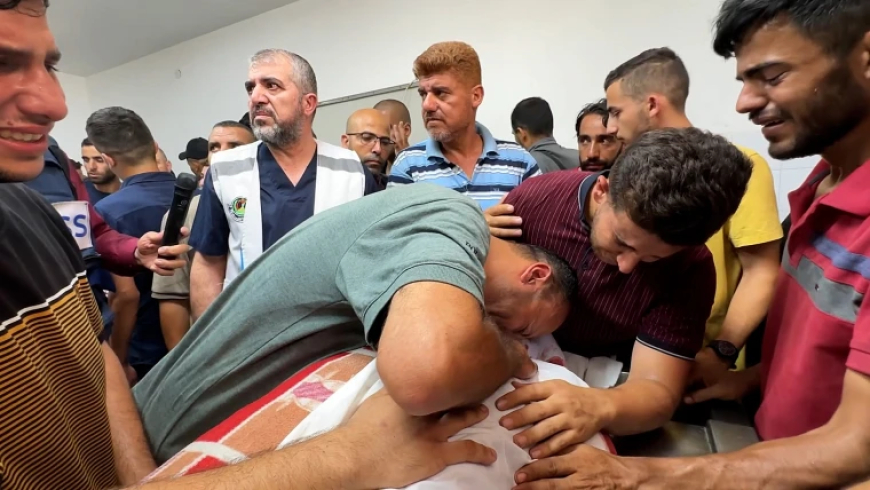Gaza’s Frontline Heroes: How Doctors Are Caught in the Crossfire Amid Escalating Conflict
Gaza’s medical professionals are facing unprecedented challenges as hospitals come under direct fire. This report delves into the humanitarian crisis and the growing risks to healthcare workers in the region.

Gaza’s Frontline Heroes: How Doctors Are Caught in the Crossfire Amid Escalating Conflict
By Ronald Kapper
As the Israel-Gaza conflict continues to escalate, an alarming new dimension of the crisis is unfolding — medical professionals in Gaza are increasingly becoming targets, intentionally or otherwise, as hospitals are bombarded and health facilities reduced to rubble.
For many in the besieged enclave, doctors have long been a lifeline amid war. But now, the very sanctuaries meant to preserve life are under fire, with physicians and nurses operating under conditions unimaginable in most parts of the world.
Hospitals Under Siege: The Alarming Reality
In the past several weeks, at least a dozen medical facilities across Gaza, including prominent hospitals such as Al-Shifa and Al-Aqsa Martyrs Hospital, have reported direct attacks or near-miss incidents. The World Health Organization (WHO) has verified over 500 attacks on healthcare facilities and personnel in Gaza since the conflict reignited in 2023.
The Gaza Health Ministry has released harrowing footage and reports detailing damaged intensive care units, collapsed operating theaters, and doctors performing surgeries without anesthesia due to ongoing power outages and blocked supply routes. The conditions have pushed the already fragile healthcare infrastructure to the brink of total collapse.
“We are treating patients in darkness, using flashlights and makeshift tools. Every day, we fear our hospital might be next,” said Dr. Samir al-Qudra, a trauma surgeon working at a field hospital in northern Gaza.
Medical Neutrality Violated
Medical neutrality — a core principle under the Geneva Conventions — mandates that healthcare workers and facilities should never be targeted during armed conflicts. However, human rights organizations, including Doctors Without Borders (Médecins Sans Frontières) and Amnesty International, have accused both parties of breaching these rules, citing deliberate strikes on ambulance convoys and clinics.
In one particularly distressing case, four doctors at the Indonesian Hospital in northern Gaza were killed when an airstrike hit the maternity ward. At the time, the hospital was filled with hundreds of civilians seeking shelter.
Humanitarian Crisis Spirals
The targeting of hospitals and medical staff not only results in the immediate loss of lives but has far-reaching implications for public health in the territory. Gaza’s 2.3 million residents are now grappling with the rapid spread of infectious diseases such as cholera and respiratory infections due to unsanitary conditions and the lack of adequate medical care.
Children, the elderly, and pregnant women are particularly vulnerable. According to UNICEF, over 65% of children under five in Gaza are suffering from acute malnutrition — a figure that has doubled in the past six months.
International Response: Condemnation Without Action?
Despite repeated condemnations by the United Nations, WHO, and the International Committee of the Red Cross (ICRC), there appears to be little to no de-escalation or actionable intervention. WHO Director-General Dr. Tedros Adhanom Ghebreyesus has called the attacks on Gaza's medical system “a blatant disregard for international law,” but the violence shows no signs of slowing.
A recent UN Security Council resolution demanding immediate humanitarian access to Gaza was vetoed, fueling further frustration among global health advocates and NGOs on the ground.
The Psychological Toll on Doctors
In addition to the physical danger, Gaza’s doctors are facing immense emotional and psychological trauma. Many are working 20-hour shifts without rest, often tending to family members among the wounded or dead.
“I have lost count of the number of times I’ve cried behind my surgical mask,” said Dr. Leila Hani, a pediatrician at a makeshift emergency shelter. “We are breaking — emotionally, spiritually, and physically.”
Mental health professionals — a rare resource in Gaza — are now among the displaced, and suicide rates among healthcare workers are rising, as reported by the Palestinian Medical Relief Society.
A Plea to the World
Amid the horror, Gaza’s medical professionals continue to stand as symbols of courage and resilience. But their plea is clear: stop targeting healthcare. Physicians, nurses, paramedics, and support staff are not combatants — they are caregivers, working in impossible conditions to save lives.
International humanitarian organizations are calling for the urgent establishment of safe corridors to allow for the evacuation of the wounded and to deliver medical supplies. The situation remains fluid, and without immediate intervention, experts warn of a complete health catastrophe in the region.
Conclusion: More Than a Crisis — A Moral Emergency
The plight of Gaza’s doctors is not just a regional concern — it is a global humanitarian and ethical issue. The targeting of medical professionals in conflict zones violates the core values of humanity. As the world watches in real time, the question remains: How many more doctors must die before there is meaningful change?














